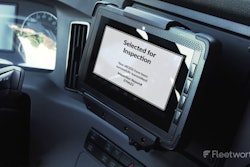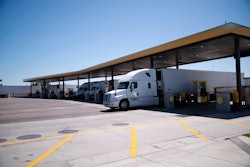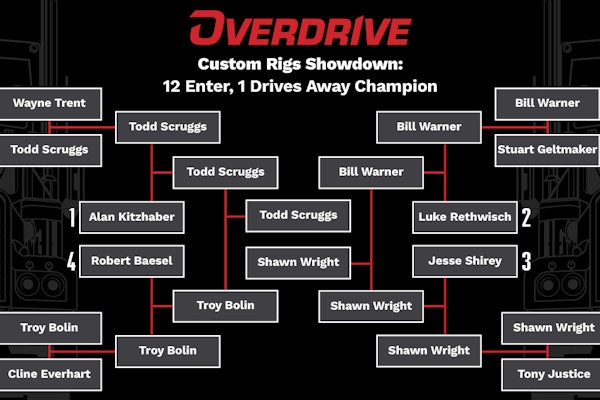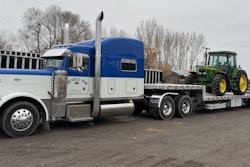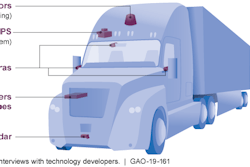President Donald Trump's executive order boosting enforcement of English language proficiency (ELP) standards has quickly already become guidance for inspectors across the country. Yet there's another, less understood component to the executive order that might have a bigger impact.
The Trump Department of Transportation's review of non-domiciled CDLs initially came almost as a footnote to the executive order mandating ELP be placed back into the out-of-service criteria. Nobody at the federal level even knows how many non-domiciled CDLs states have issued. It's unclear if the DOT's "review" of non-domiciled CDLs will lead to any action, much less end the practice or revoke anyone's valid CDL, but the very notion of a non-domiciled CDL certainly made an impression on many in trucking.
Overdrive has been documenting a rise in the percentage of non-domiciled CDLs issued by some states. This year so far (as of April), Illinois issued 40% of all its CDLs to people who aren't citizens of the state. It's true that sometimes states issue non-domiciled CDLs to drivers who are U.S. citizens, just not citizens of that state, but this final portion of our four-question survey asked whether or not U.S. states should be able to grant CDLs to non-U.S. citizens in the country with work authorization, as shown in the chart.

Nearly half of respondents objected to allowing drivers from foreign countries on safety and economic grounds, answering: "No, truck drivers from other countries hurt U.S. wages and/or overall road safety."
Many in that camp brought up additional concerns not just for their safety and livelihoods, but the rights of those non-citizen drivers.
In the words of one respondent, authorities shouldn't allow "companies to bring drivers from other countries and guide them to licenses and drivers' permits ..., because those drivers don’t have a real scoop of the law and the transportation system, and many times are forced by those companies to work underpaid and illegally because of their ignorance of the laws and regulations."
Another commenter felt non-citizens and non-English speakers were likely to be exploited, asked to run over their hours, and not know their rights or how to advocate for them. This commenter pointed toward the hotshot trucking niche, where some seem to play dumb with the regulations, he suggested, describing encounters with foreign drivers of hotshots in business without a CDL, even, just a temporary license -- no motor carrier authority and no signage on the truck "or paper signs handwritten." Some "cannot physically produce an insurance cert that has the vehicle's VIN, trailer's VIN, or their name on it. ... They bypass scales and insist that they are exempt" (they're not) because they're below 26,000 lbs.
When that commenter tells brokers what he's seeing, he doesn't exactly find a partner willing to address safety and compliance issues. Some go so far as to "pull the racist card if I question any of the above," he said. "I'm told it's not my problem, not my load, and definitely not my responsibility to verify who is picking up the load from me. Greed is a strong motivator in this business."
Another commenter accused bad actor carriers of exploiting employees by falsifying ELD records or illegally classifying employees as independent contractors. "All of this serves to drive down rates to the point American carriers can't stay in business, and it leads to higher insurance costs due to untrained, unqualified, and illiterate drivers causing more accidents."
"American truck drivers out here on the road are a thing of the past. American truck drivers are a minority now. I’ve been driving 15 years and have been around this industry all my life. Go to any TA or Petro and just watch who walks to and from the fuel desk. I would say 50% of the drivers on the road now are not from America."
One former driver who now works in highway maintenance tied driver citizenship to driver safety. "It is very frustrating to see the trucking industry in its current condition. Most drivers I encounter during winter operations have no idea how to operate in adverse weather," he said, and "I can’t help because they don’t speak English."
Others also mentioned "the race card," or the racial element to assessing and commenting on the citizenship of your fellow drivers.
"Anyone who drives knows this is a problem, but it’s really not the language barrier, it’s how a lot of these guys are driving," one respondent noted. "I know profiling is racist, but it is what it is. The things you see trucks doing the last three to five years are disturbing."
While race certainly came up, commenters mostly focused on national origin, including mentions of drivers from Europe, Africa and Asia.
[Related: Trump DOT 'ELP mandate' for drivers could boost rates 15%: Analysis]
Some felt truckers in the U.S. working temporarily could be a real drag on rates. "Drivers working temporarily also hurt U.S wages and U.S. roads' safety" as temporary hires "have no plans to stay here and invest $0 in this economy and work for less money," wrote one.
"Foreigners are doing to the trucking industry what China is accused of doing to the manufacturing industry in America," wrote one commenter, with another contending non-citizen drivers "are the ones driving rates down hauling freight for pennies on the dollar, causing accidents and making everyone on the road less safe."
Overdrive has no way to measure the relationship between safety and citizenship or ELP, but survey commenters offered no shortage of anecdotes, including some suggesting the citizenship question explained large-truck pileups seen out West during winter.
Among less strident respondents to the survey, 15% were measured on states issuing CDLs to non-citizens -- states should "probably not" be allowed to do it given drivers without long experience on U.S. highways "won’t have developed the right habits to be an effective, safe driver here."
Another 11% said "maybe" states should be allowed to continue the practice, "depending on how well the individual CDL test taker knows U.S. road rules and conventions."
That 11% carefully draws a line between citizenship status and driving skill, but recently the CDL testing industry itself has called out FMCSA on lax enforcement and allowing unsafe schools to continue operating. Many commenters saw training problems compounding the issues: 25% supported CDLs for non-citizens, as long as the CDL testing is up to snuff. "Eliminate the fraudulent driving schools that are passing drivers for quick cash," wrote one commenter.
As wrote another, "There are more than 50 languages spoken in Europe. Drivers from all countries go to all countries with no problems. Drivers should be tested for driving skills, not knowledge of English."
Read responses to, results from all the survey questions:
Question 1: Is ELP enforcement truly necessary?
Question 2: What percentage of drivers don't speak English?
Question 3: Do truckers want ELP to be an OOS violation?
Question 4: Non-domiciled CDLs: Should states allow them to go to non-citizens?
Return to the beginning of the series
UPDATE July 25, 2025: Subsequent Overdrive reporting revealed non-domiciled CDL issuance numbers and practices in the 50 states across the country with a 20-page special report, published July 23. Download the report via the module below:

